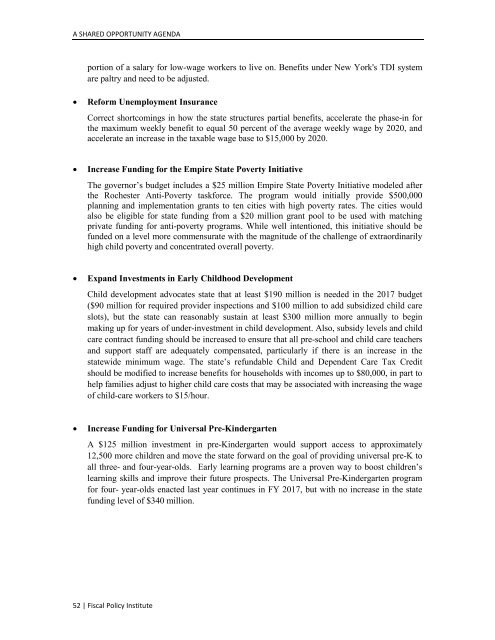2016-2017
1PSJ98W
1PSJ98W
You also want an ePaper? Increase the reach of your titles
YUMPU automatically turns print PDFs into web optimized ePapers that Google loves.
A SHARED OPPORTUNITY AGENDA<br />
portion of a salary for low-wage workers to live on. Benefits under New York's TDI system<br />
are paltry and need to be adjusted.<br />
• Reform Unemployment Insurance<br />
Correct shortcomings in how the state structures partial benefits, accelerate the phase-in for<br />
the maximum weekly benefit to equal 50 percent of the average weekly wage by 2020, and<br />
accelerate an increase in the taxable wage base to $15,000 by 2020.<br />
• Increase Funding for the Empire State Poverty Initiative<br />
The governor’s budget includes a $25 million Empire State Poverty Initiative modeled after<br />
the Rochester Anti-Poverty taskforce. The program would initially provide $500,000<br />
planning and implementation grants to ten cities with high poverty rates. The cities would<br />
also be eligible for state funding from a $20 million grant pool to be used with matching<br />
private funding for anti-poverty programs. While well intentioned, this initiative should be<br />
funded on a level more commensurate with the magnitude of the challenge of extraordinarily<br />
high child poverty and concentrated overall poverty.<br />
• Expand Investments in Early Childhood Development<br />
Child development advocates state that at least $190 million is needed in the <strong>2017</strong> budget<br />
($90 million for required provider inspections and $100 million to add subsidized child care<br />
slots), but the state can reasonably sustain at least $300 million more annually to begin<br />
making up for years of under-investment in child development. Also, subsidy levels and child<br />
care contract funding should be increased to ensure that all pre-school and child care teachers<br />
and support staff are adequately compensated, particularly if there is an increase in the<br />
statewide minimum wage. The state’s refundable Child and Dependent Care Tax Credit<br />
should be modified to increase benefits for households with incomes up to $80,000, in part to<br />
help families adjust to higher child care costs that may be associated with increasing the wage<br />
of child-care workers to $15/hour.<br />
• Increase Funding for Universal Pre-Kindergarten<br />
A $125 million investment in pre-Kindergarten would support access to approximately<br />
12,500 more children and move the state forward on the goal of providing universal pre-K to<br />
all three- and four-year-olds. Early learning programs are a proven way to boost children’s<br />
learning skills and improve their future prospects. The Universal Pre-Kindergarten program<br />
for four- year-olds enacted last year continues in FY <strong>2017</strong>, but with no increase in the state<br />
funding level of $340 million.<br />
52 | Fiscal Policy Institute


